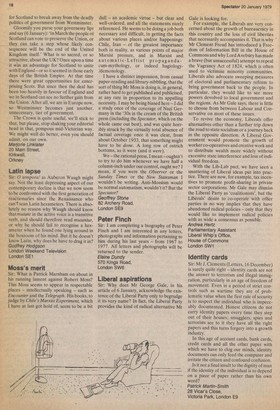Liberal aspirations
Sir: Why does Mr George Gale, in his article of 6 January, acknowledge the existence of the Liberal Party only to begrudge it its very name? In fact, the Liberal Party provides the kind of radical alternative Mr Gale is looking for.
For example, the Liberals are very concerned about the growth of bureaucracy in this country and the loss of civil liberties that necessarily accompanies it. That is why Mr Clement Freud has introduced a Freedom of Information Bill in the House of Commons and why Lord Avebury has made a brave (but unsuccessful) attempt to repeal the Vagrancy Act of 1824, which is often used to victimise minority communities. Liberals also advocate sweeping measures of electoral and parliamentary reform to bring government back to the people. In particular, they would like to see more powers devolved to local government and the regions. As Mr Gale says, there is little to choose from between Labour and Conservative on most of these issues.
To revive the economy, Liberals offer alternatives other than a further trip down the road to state socialism or a journey back in the opposite direction. A Liberal Government would promote the growth of worker co-operatives and creative work and to distribute wealth more widely without excessive state interference and loss of individual freedom.
With the Lib-Lab pact, we have seen a smattering of Liberal ideas put into practice. There are now, for example, tax incentives to promote profit-sharing in private sector corporations. Mr Gale may dismiss the Liberal Party as 'coalitionists', but the Liberals' desire to Co-operate with other parties in no way implies that they have abandoned radical policies — only that they would like to implement radical policies with as wide a consensus as possible. Andrea Hertz Parliamentary Assistant Liberal Whip's Office, House of Commons London SW1


































 Previous page
Previous page